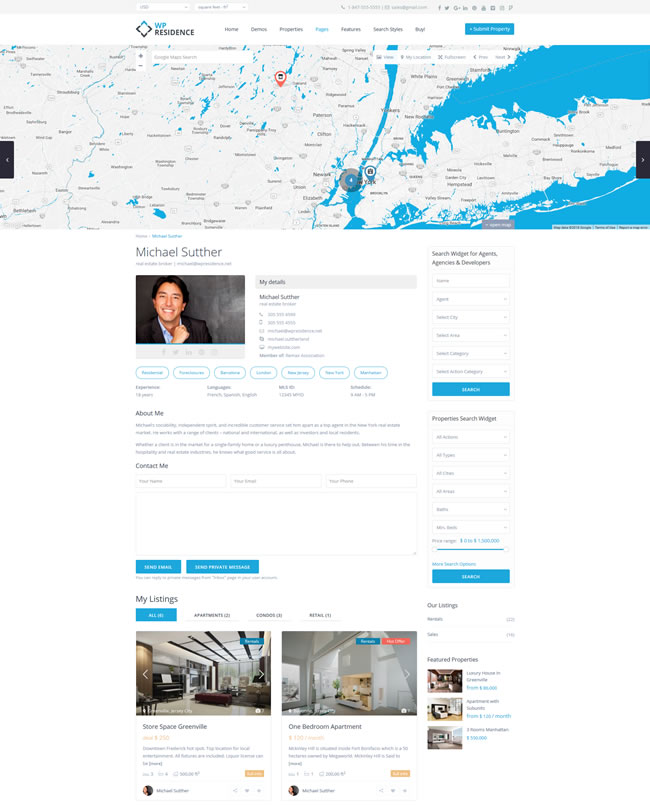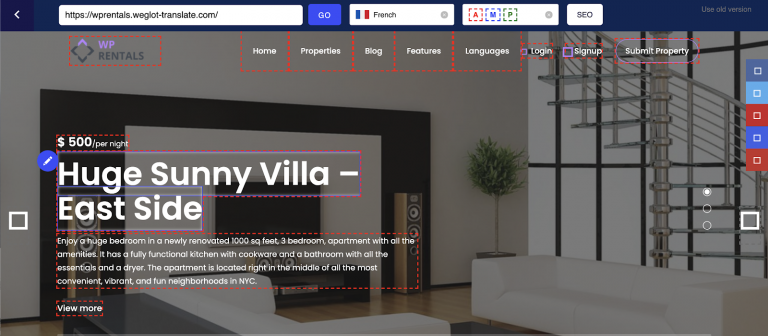Your website is your online business card. This is the reason why so many real estate gurus invest so much time and money into maintaining a professional real estate website.
Not only that, but your website can also be a real estate lead generation magnet if properly developed and maintained.
The sad truth is that many realtors don’t give their websites the attention it deserves and would rather waste their efforts on outdated marketing techniques.
It’s a vicious cycle where realtors don’t devote time and effort into their online presence, get fewer visitors or leads from their website and then spend even less time to managing their website.
In this article, we’ll look at the top 12 reasons why you’re losing website visitors in 2018 and how you can fix it.
Topics we’ll cover in this article:
- Boring websites don’t get visitors
- Not having a proper blog
- Bad design equals bad UX
- Generic about me page
- Old or generic photos
- Old content & copy content
- Cluttered site & pages
- Non-responsive websites
- Broken links and pages
- Fonts & colors
- Keyword stuffing
- Too many Pop-ups
- Conclusions
1. Boring websites don’t get visitors
Try to objectively take a look at your site, not as an owner but as a simple visitor or potential client. Is it interesting?
Would you check the pages? Are you drawn to it or is it plain boring?
If you don’t find your website interesting, neither will the public – in fact, they will find it even more boring.
The real estate business is tough, and competition is high. Boring websites spamming with “we are professional” “we offer quality” are plenty but they don’t get many visitors and even less leads.
Too many realtors build a website because they know they must have one and then they abandon it without giving it a second look.
Stale content, broken links, terrible colors or themes – this is the perfect recipe for an annoying website.
How to fix it:
Spend some time and funds on content marketing efforts. Create valuable content on your website and draw potential customers in.
As mentioned before, your website should be out there working for you just as much as you do by generating leads.

2. Not having a proper blog for your business
While many realtors think and know it’s a good idea to have a company blog, the sad truth is that many don’t do it or don’t follow it through.
You need to have consistency in all areas of your work, and your blog is no different.
By not having a well-maintained blog you’re missing out on potential conversions and a great way to get in touch with your potential clients.
The blog and the about page are the only pages which create a connection between realtors and visitors.
Another big mistake realtors make is that they merely use copy content on their blogs – this is not only unethical but it also drastically lowers your SEO standing with Google.
How to fix it:
Take your time and create in-depth content that your visitors will enjoy.
Infographics are an excellent pick for realtors because they allow visitors to skim through lots of information and gain in-depth knowledge quickly.
If you’re having trouble with maintaining your blog or writing SEO-friendly posts, simply delegate the task to someone who’s passionate and willing to tackle the job.
3. Bad design equals lousy user experience
Sometimes webmasters tend to get sloppy with their work, or they tend to focus on different things such as colors instead of what matters – good design and excellent user experience.
If you have a menu that’s all over the place or it doesn’t make much sense when you’re in for a bad time. Your website’s bounce rate will be through the roof and conversions will be minimal.
Huge drop-down menus might have been popular 10 years ago but nowadays they’re a drag for users.
User experience is king nowadays.
How to fix it:
Have a user-friendly website or pick a user-friendly real estate theme if you’re using Word press.
Place links intuitively and maintain a simple menu that’s easy to see, read and click.

4. Generic about me page
The about me page is the second most viewed page on every website, after the home page. Interestingly enough, it also tends to be the worst written page on every site.
Visitors click on the about me page because they want to know you better, create a connection with you or get to know your team – they want to see if you’re someone they can relate and eventually work with.
They want to know your passions and your drives, how you got into the real estate business, not about awards or your education or even worse, curriculum vitae.
How to fix it:
Devote some time and effort into making your about me page as pleasant as possible.
Allow potential customers to get to know you better through text, images, and even video.
For more in-depth tips you can check the “how to create the perfect real estate page” article.

5. Old or generic photos
There’s nothing worse than using low quality or generic photos on your website or Facebook page for that matter.
The internet is riddled with websites filled with generic photos – a huge mistake. Generic images don’t instill trust and make you look unprofessional or a scam.
How to fix it:
If you are running a team of realtors, you can create separate about me pages with pictures of your team members.
Your websites pictures need to be fresh and offer visitors a glimpse into your company, business, and values.
6. Old content & copy content
If you built your website 2-3 years ago and never updated your homepage content since then, you’re in for a bad time.
Visitors will most likely bounce from your website immediately after loading it if they see articles or texts from a few years ago.
People interested in real estate want the latest in-depth news and trends, not any old article from way back.
Another huge problem for real estate websites is the use of copy content. By using copy content Google penalizes your site, and your SEO ranking plummets.
How to fix it:
Write original content for your site.
Provide your visitors with value, and they will return time and time again, increasing the chance of turning them into paying customers.

7. Cluttered site & pages
There’s nothing worse than staring at a cluttered page and trying to figure out what it wants you to do.
Websites built a few years ago tended to be very cluttered with images, drop-down menus and blocks of text that would sometimes overlap.
How to fix it:
User Experience is the key to having a successful website, and sometimes less is more.
Make your pages attractive and straightforward – users need to see the information piece by piece, not all at once.
For blog posts, consider creating pages with plenty of white space, lists, bullets, and multimedia. Every article should be a breath of fresh air for your visitors.
8. Non-responsive website
Nowadays around 80% of users surf the internet from their mobile phones or tablets.
If your website is not mobile-friendly, you’re missing on potentially valuable business.
With plenty of responsive real estate WordPress themes available, there’s no excuse for having a website that’s not mobile-friendly.
How to fix it:
If you are building a website, choose a professional real estate WordPress theme.
If you already have a website and want to make it mobile friendly, a plugin may help but switching your theme is much better.
If you want to optimize your website further, you can create unique pages which are easier to navigate for mobile users.
Time means money for you as well as for your clients.

9. Broken links and pages
Broken links and pages can send traffic away from your website without you even knowing.
It can also be an SEO-related problem if you have backlinks set on broken pages – you may be missing out on traffic as well as link juice.
Broken pages may have misplaced text or images, code errors or oddly placed links.
How to fix it:
Check your most important pages for any problems. You should do this manually and objectively.
If you have a larger site, you can use a broken link checker to search for any problems and then fix them.
10. Fonts & colors
If you have a bold color for a background, it can be hard on the eyes of your users.
Small fonts can be troublesome for older individuals while “funny” fonts can annoy users enough to quit your website altogether.
How to fix it:
Clean website with plenty of white space and that is not hard on the eyes is the way to go.
Keep your background color white or as close to white as possible, along with one or two primary colors from your logo to accentuate buttons or bold text.
Keep your fonts simple and readable – remember that your website is not just about you, it’s about your visitors as well.
11. Keyword stuffing
Keyword stuffing was very popular around 10 years ago, and it was done all over the place – in content, in Meta titles, Meta descriptions, just about everywhere.
It was used so much because in part, it worked pretty well and you could get your site to rank for specific keywords just by stuffing them everywhere.
Nowadays Google changed its search algorithm, and keyword stuffing is looked down upon by search engines AND users.
How to fix it:
Remove your stuffed texts, if any and try to write good titles and Meta descriptions for your pages.
It will help your websites SEO and make it easier for users to find the pages they need.
12. Too many Pop-ups
Most real estate websites use popups to gather emails for databases or to offer special promotions on specific products or services.
Although they may be useful in certain circumstances, users generally dislike pop-ups, and if you’re using too many or poorly written pop-ups, you might come across as unprofessional, pushy or even rude.
How to fix it:
You can use pop-ups in certain circumstances – if it’s well written and not intrusive, for example.
You can also scrap pop-ups all together and find different ways to grow your newsletter database – for example, an e-book or study on the real estate market would help your email marketing efforts while providing users with great content.
Conclusions
Your website should be at the center of your marketing efforts in 2018.
It can be a well-oiled lead generating machine or something you’re just too embarrassed to show off to potential clients.
By following the tips above you’ll be able to rebrand your website with ease into something that looks and feels professional.





